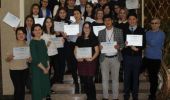3-05-2016, 11:47 Category: English, Education & Trainings, Trends, News
Journalism must become the key vehicle in countering hate speech, xenophobia and propaganda in media and on the Internet.
On the occasion of the World Press Freedom Day celebrated on May 3, 2016, the School of Peacemaking and Media Technology in Central Asia encourages the promotion of quality journalism and ethic communications in order to counter modern challenges.
In Central Asia, as well as in many other countries around the world, the crisis in the media sphere has been caused by the governmental control, lack of journalism standards, and increasing language of intolerance. Continuous monitoring and studies of media and Internet highlight such trends. Xenophobia and its various types are expressed in open or veiled forms of intolerance in the media environment, which results in the hostility in response, negative impact on the audience, and encouragement of inhumane stereotypes in the society. The negative discourse is promoted by the propaganda, network aggression, and a series of fibs circulated in media and Internet.
The range of network hate groups, where users are eager to discuss urgent issues using various forms of the language of intolerance including tough calls, is expanding, which can have serious consequences both for the society and the authors.
"The freedom of expression is a right of every human being, but in the digital age some people abuse the trust and intolerance of others,” Inga Sikorskaya, director of the School of Peacemaking and Media Technologies in Central Asia, said. "Our researches of the media sphere have shown that often many journalists and users fail to understand the difference between the freedom and hate speech. Although ethical standards can resist self-censorship, hate speech and inhumane stereotypes.”
The School of Peacemaking and Media Technology implements a few programs to combat hate speech in key spheres of content-making that involve the issues of ethical, cultural and religious diversity, transparency, conflicts, rights, gender, and arranges public dialogs with politicians, media outlets and groups of civic society of Kyrgyzstan and Kazakhstan in order to encourage media literacy and overcome intolerance. In order to help journalists, activists and developers of online content identify and eliminate hate speech, the experts have developed new trainings and master classes held in Central Asia and other countries.
"Due to the growing threat in the online environment, media and reporters should make more efforts to eliminate stereotypes and cliches, thus promoting the reduction of conflicts in the society,” Alina Amilaeva, Program Assistant of the School of Peacemaking and Media Technology in Central Asia, said.

The School of Peacemaking and Media Technology in Central Asia announces an annual competition among students from Kyrgyzstan, Kazakhstan,…

25 journalists and media workers from various regions of Kyrgyzstan have been trained to counter the propaganda of violent extremism and hate in…